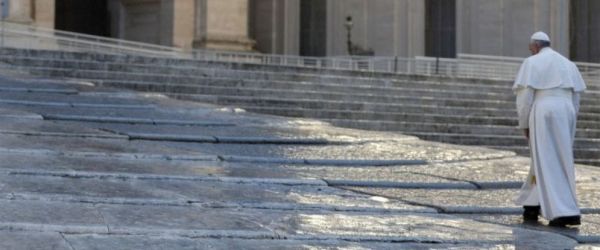In this passage of the Gospel (see Jn 14:1-14), Jesus’s farewell discourse, Jesus says that He is going to the Father. And He says that He will be with the Father, and that also those who believe in Him “will do the works I have been doing, and they will do even greater things than these, because I am going to the Father. And I will do whatever you ask in my name, so that the Father may be glorified in the Son. You may ask me anything in my name, and I will do it” (vv. 12-14). We can say that this passage of the Gospel of John is the declaration of ascent to the Father.
The Father was always present in Jesus's life , and Jesus spoke about Him. Jesus prayed to the Father. And many times, He spoke about the Father who cares for us, as He cares for the birds, the lilies of the field… the Father. And when the disciples asked to learn how to pray, Jesus taught them to pray to the Father: “Our Father” (Mt 6:9). He always addresses the Father. But in this passage it is very strong; it is also as if He opened the doors of the omnipotence of prayer. “Because I am with the Father: ask me and I will do anything. Because the Father will do it with me” (see Jn 14:11). This trust in the Father, trust in the Father who is capable of doing everything, This courage to pray, because it takes courage to pray! It takes the same courage, the same boldness it takes to preach: the same. Let us think of our father Abraham, when he - I think the right word is - “negotiated” with God to save Sodom (see Gen 18:20-33: “And if there were fewer? And fewer? And fewer…? He truly knew how to negotiate. But always with this courage: “Excuse me, Lord, but give me a discount: a bit less, a bit less…”. Always the courage of struggling in prayer, because praying is struggling: struggling with God. And then, Moses: the two occasions that the Lord wanted to destroy the people (see Ex 32:1-35 and Nm 11:1-3), and to make him the leader of another people, Moses said “No!”. And he said “No” to the Father! With courage! But if you go and pray like this [whispers a timid prayer] - this is a lack of respect! Praying is going with Jesus to the Father who will give you everything. Courage in prayer, boldness in prayer. The same that it takes to preach.
And we have heard in the first Reading about that conflict in the early times of the Church (see Acts 6:1-7), because the Christians of Greek origin were grumbling, complaining - they were already doing it back then: it is obvious that it is one of the Church's habits - they were complaining that their widows, their orphans were not well cared for; the apostles did not have the time to do many things. And Peter [with the apostles], enlightened by the Holy Spirit, “invented”, let’s put it that way, the deacons. “Let’s do something: let’s look for seven people who are good and these men can take care of the service” (see Acts 6:2-4). The deacon is the one who takes care of service, in the Church. “And so these people, who are right to complain, have their needs taken care of, and we”, Peter says, we heard him, “and we can devote ourselves to prayer and the proclamation of the Word” (see v. 5). This is the bishop's task: praying and preaching. With this power that we heard in the Gospel: the bishop is the first who goes to the Father, with the trust that Jesus gave him, with courage, with parrhesia, to fight for his people. The first task of a bishop is to pray. Peter said so: “And to us, prayer and the proclamation of the Gospel”.
I knew a priest, a holy parish priest, good, who when he found a bishop, greeted him well, very amiably, and always asked the question: “Your Excellency, how many hours a day do you pray?”, and he always said, “Because your first task is to pray”. Because it is the prayer of the head of the community, interceding to the Father so that He may safeguard the people.
The prayer of the bishop, the first task: to pray. And the people, seeing the bishop pray, learn to pray. Because the Holy Spirit teaches us that it is God who does things. We do very little but it is He who “does things” in the Church, and prayer is what makes the Church progress. And therefore the heads of the Church, so to speak, the bishops, must persevere in prayer.
Peter’s word in this case is prophetic: “May the deacons do all this, so that the people are taken care of well, their problems are solved and their needs met. But to us, bishops, prayer and the proclamation of the Word”.
It is sad to see good bishops, good people, but busy with many things, the finances, with this, that and the other… Prayer must take first place. Then the other things. But when the other things take away space from prayer, then something is not right. And prayer is strong because of what we have heard in the Gospel of Jesus. It is “because I am going to the Father. And I will do whatever you ask in my name, so that the Father may be glorified in the Son” (Jn 14:12-13). Thus the Church progresses in prayer, in the courage of prayer because the Church knows that without this ascent to the Father, she cannot survive.
[Pope Francis, St Marta homily 10 May 2020]












